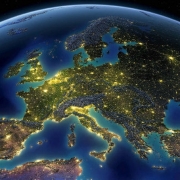The Internet of Things, backbone of a new digital third industrial revolution economic model
We are on the cusp of a Third Industrial Revolution based on a new digital technology. The digitized broadband Communication Internet is converging with a digitized Renewable energy Internet, powered by solar and wind electricity, and a digitized Mobility and Logistics Internet of autonomous electric and fuel-cell vehicles, powered by green energy, atop an Internet of Things (IoT) platform, embedded in a zero-emission commercial, residential, and industrial building stock to manage, power, and move society in the twenty-first century.
Existing and new Buildings—residential, commercial, industrial, and institutional—are being retrofitted and transformed into resilient zero-carbon energy efficient smart nodes and networks embedded in an Internet of Things matrix. Building nodes, connected to the IoT infrastructure, will act as distributed edge data centers, green micro power-generating plants, energy storage sites, and transport and logistics hubs to manage, power, and move economic activity and social life.
Buildings will no longer be passive, walled-off private spaces but, rather, actively engaged entities sharing their renewable energies, energy efficiencies, energy storage, electric mobility, and a wide range of other economic activity with one another at the discretion of their occupants. Millions of vehicles will be powered by solar energy and move driverless thanks to billions sensors.
The new smart sustainable infrastructure will involve every sector and industry and make possible the new business models and mass employment opportunities that characterize the shift to a green economy and the new business practices that plug into it will result in a giant leap in “aggregate efficiency” while ushering in a zero-carbon ecologically sustainable and highly-resilient circular economy.
The digital economy also raises risks and challenges, not the least of which is guaranteeing network neutrality to ensure everyone has equal access to the networks, protecting privacy, ensuring data security, and thwarting cybercrime and cyberterrorism.
How do we prevent nation-states from hacking into other countries’ social media and spreading misinformation to influence the outcome of their elections? How do we push back against giant internet companies becoming monopolies and commodifying our personal online data for sale to third parties for commercial uses? The dark side of the internet will require vigilant regulatory oversight at the local, state, and national levels.




Leave a Reply
Want to join the discussion?Feel free to contribute!